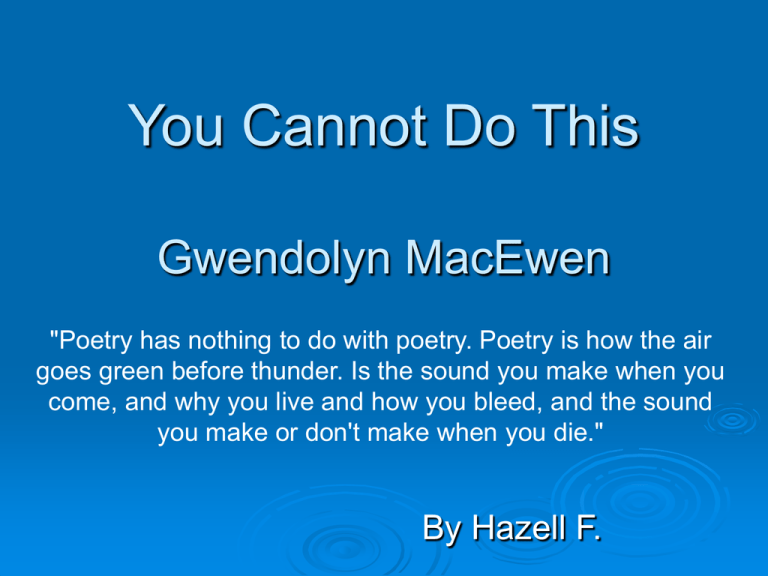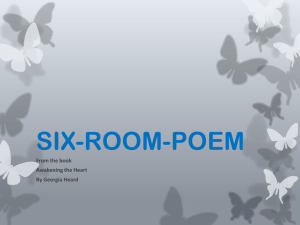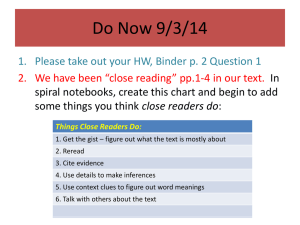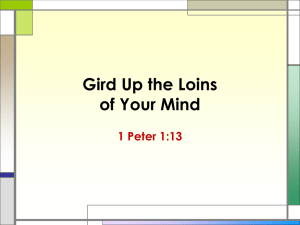You Cannot Do This Gwendolyn MacEwen
advertisement

You Cannot Do This Gwendolyn MacEwen "Poetry has nothing to do with poetry. Poetry is how the air goes green before thunder. Is the sound you make when you come, and why you live and how you bleed, and the sound you make or don't make when you die." By Hazell F. You Cannot Do This Gwendolyn MacEwen you cannot do this to them, these are my people; I am not speaking of poetry, I am not speaking of art. you cannot do this to them, these are my people. you cannot hack away the horizon in front of their eyes. the tomb, articulate, will record your doing; I will record it also, this is not art. this is a kind of science, a kind of hobby, a kind of personal vice like coin collecting. it has something to do with horses and signet rings and school trophies; it has something to do with pride of the loins; it has something to do with good food and music, and something to do with power, and dancing. you cannot do this to them, these are my people. Words you might not know Articulate – Clearly express (an idea or feeling) Vice – Habit regarded as a weakness in someone’s character Signet rings – A small finger ring containing a small seal (one’s initials or the like) Loins – The womb or a euphemism for the reproductive organs. Gwendolyn MacEwen Born in Toronto 1941 Died in Toronto 1987 Dropped out of high school to become a writer. Became famous in the world of Canadian literature. Mother was in and out of mental hospital and her father was an alcoholic. She also became an alcoholic and it is thought to be the cause of her death. Ideas What are your own ideas? There are many different interpretations of this poem none of them write or wrong. I will focus on two of these 1. As a poem on aristocracy 2. As a war poem (You might also want to check out this website which has an interesting view on the poem http://readingchildrensbooks.blogspot.com/2011/ 03/you-cannot-do-this-by-gwendolynmacewen.html ) Aristocracy Being Overturned One idea is that this poem is about the upper classes being challenged by the lower classes and an uprising occurring. Voice: The narrator in the poem is maybe a queen or someone high up in society and is speaking out to the people who are committing the atrocity’s against her people. Tone: The tone is challenging and defending and also kind of shocked ‘how can you do this?’ Structure: The poem is split into three stanzas. The first is her standing up and declaring “you cannot do this”. The second is explaining how this is not just a poem but a record of what is happening. The third (which is longer than the others) is describing their lives and how they should be. It is in free verse representing the freedom they once enjoyed and deserve to keep. Imagery: One of the most striking images in this poem is in the metaphor “you cannot hack away the horizon in front of their eyes” the horizon represents the sunrise and a new day, so symbolizes the taking away of their future and their hope. The word hack is also very brutal and suggests violence. The only other negative image in the poem is the metaphor of “the tomb, articulate, will record your doing;” a tomb can’t literally speak but it will show the generations after what has happened and will serve as a record so no one is able to forget and all will know about the deaths that occurred. The last stanza contains a lot of imagery and gives us an insight into what their culture and lives were like. The “horses” symbolize grandeur and nobility, also note wild horses symbolize freedom something which is trying to be taken from them. The “signet rings” are a symbol of power and usually engraved the coat of arms and was passed down the generations so represent family history and tradition. The “pride of the loins” is the pride felt for the descendents and children which links with the “school trophies;” representing all their accomplishments and achievements. The “good food and music” creates an image of feasts and celebrations along with the “dancing” which gives a sense of enjoyment and happiness. Diction: The poem starts with the word “you” which is in 2nd person and is very direct and helps to create the challenging tone in the poem and is almost accusatory. The word “my” also gives a real sense of maternal protectiveness like she is trying to shield them. It portrays the real sense of grief and hurt she must be feeling. Punctuation: The fact that there are no capital letters at the start of sentences means that all the letters are in the same case maybe representing the fact that the divisions between the social classes is being removed and the upper classes are being stripped of their status, power and money. Interestingly the only capital letter in the poem is the “I” which shows how the narrator is still standing up and trying to do something to stop what is happening. Mood: Is defiant, bold and strong. A Woman’s Experience of War Another idea is that this poem is about the experience of war from a woman’s perspective and how it effects not just the soldiers but the community and women left behind. Voice: The narrator in this poem is that of a woman during war time who is trying to stop the war and who is forced to stay and watch as all the young men are taken away to war. Tone: Is challenging and protective but also in a sense futile and despondent. Structure: The first stanza is about her standing up against the war and speaking out against it. The second stanza is about how this is a record of what is happening and being done just like the tombs of the soldiers never to return. The third stanza is describing all the things that they will miss out on. The poem is in free verse which contrasts the lack of freedom the soldiers and everyone else has on what happens. Interesting as aren’t they meant to be fighting for freedom? Imagery: The most powerful, vivid image in this poem comes from the metaphor “you cannot hack away the horizon in front of their eyes” which is a very brutal and violent image representing the taking away of their lives and futures and through that the future hopes of the women and community left behind. The fact it is in front of their eyes creates a sense of sadness as there was no escape it was right in front of them. The metaphor “the tomb, articulate, will record your doing” shows how although the tombs can’t speak they will tell of the deaths, what happened and what you caused so no one is able to forget and future generations will know. The “school trophies” represent the childhood they missed out on and all the triumph’s they never got to experience. The “pride of the loins” represent the children and families they will never have. The “good food and music” “and dancing” show the parties and good times they would have enjoyed. Diction: The poem starts with a sudden challenge as “you” is used as if directly to the reader. The suddenness shows how war can suddenly come upon you and take away everything, the only life you have ever known will suddenly be totally changed forever. Also the use of “my” is very inclusive and is non-judgmental she is standing up for everyone who is affected by war. Repetition: The repeated “you cannot do this to them, these are my people” is like a drill and is ironic as it using war/training techniques to try and stop the war. Punctuation: There are no capital letters after full stops or at the beginning of the lines which doesn’t follow the normal rules representing how there are no rules in war. The only capital letter is “I” showing her standing up to the authority against war even if she has to do it all alone. Mood: It is defiant and courageous but is uncertain and ambiguous and the lack of specificity shows the uncertainty about war and how know one is sure of what is going to happen or what the future will hold. Poems to Compare With: Cambodia-James Fenton Attack-Siegfried Sassoon Anthem For A Doomed Youth-Wilfred Owen My Dreams Are Of A Field Afar-A.E Houseman For Heidi With Blue Hair-Fleur Adcock Hopefully this has helped your understanding of the poem You Cannot Do This and given you some ideas and different approaches you can work off.










